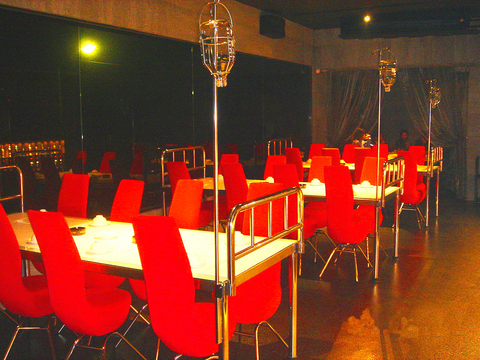When I stepped into DS Music Restaurant, I found it to be an extremely well-put-together, professional establishment with good food and a pleasant atmosphere that is night-lifey but not overwhelming. This disturbed me.
The reader is invited to consider the nurse fetish. It is an institution that lies at the heart of DS. And so I entered DS prepared to immerse myself in sleaze and then write ironically about it. What I found, though, was a disquietingly congruous marriage of unabashed hedonism and well-funded good taste.
Overall, DS looks like many other posh restaurant-and-bars, with lots of spot lighting, funny-shaped chairs, and clear alcohol bottles lit from underneath. Except that many of the tables look like sleek hospital beds, there are a few wheelchairs and crutches sitting around, backlit X-rays decorate some walls, and above each table hangs a big "IV drip," which functions like a small keg. And then, of course, there are nurses everywhere you look.

PHOTO COURTESY OF DS MUSIC RESTAURANT
The hospital theme is pervasive, but somehow subtle, or at least natural. I never thought I would say this, but it turns out that a wheelchair does not look out of place next to a wall of Smirnoff Ice bottles. There is something appealing about the audacity of taking a concept as (someone has to say it) flagrantly trashy as this and making something so cool out of it. To top it off, the food is good.
The menu consists of lightly Westernized Chinese, Japanese and Thai, with an inexplicable but not unwelcome Polynesian flare running through the presentation. The sashimi, for example, is served on a mountain of ice covered with leaves and flowers. The "Fire Pheonix Beer (sic)" (火鳳牛柳) is a successful beef-and-pineapple stir-fry served inside a hollowed-out half pineapple.
As is probably apparent in that last sentence, the English on the menu is more color commentary than viable translation. Some items -- like the pretty-good XO sauce stir-fry prawn ball (served on a bed of water convulvus) -- are more or less what they sound like, but the menu really isn't navigable without some knowledge of Chinese. Nor are the waitresses hired for their English.
It should be said that, DS, despite its thematically seamy underbelly, is family safe (the one exception is the Saturday night "showgirl" performance). The nurses outfits are not tailored to be especially kinky, and as far as I can tell the curtained-off "intensive care unit" is nothing more than a place where large groups can sit together.

On April 26, The Lancet published a letter from two doctors at Taichung-based China Medical University Hospital (CMUH) warning that “Taiwan’s Health Care System is on the Brink of Collapse.” The authors said that “Years of policy inaction and mismanagement of resources have led to the National Health Insurance system operating under unsustainable conditions.” The pushback was immediate. Errors in the paper were quickly identified and publicized, to discredit the authors (the hospital apologized). CNA reported that CMUH said the letter described Taiwan in 2021 as having 62 nurses per 10,000 people, when the correct number was 78 nurses per 10,000

As we live longer, our risk of cognitive impairment is increasing. How can we delay the onset of symptoms? Do we have to give up every indulgence or can small changes make a difference? We asked neurologists for tips on how to keep our brains healthy for life. TAKE CARE OF YOUR HEALTH “All of the sensible things that apply to bodily health apply to brain health,” says Suzanne O’Sullivan, a consultant in neurology at the National Hospital for Neurology and Neurosurgery in London, and the author of The Age of Diagnosis. “When you’re 20, you can get away with absolute

May 5 to May 11 What started out as friction between Taiwanese students at Taichung First High School and a Japanese head cook escalated dramatically over the first two weeks of May 1927. It began on April 30 when the cook’s wife knew that lotus starch used in that night’s dinner had rat feces in it, but failed to inform staff until the meal was already prepared. The students believed that her silence was intentional, and filed a complaint. The school’s Japanese administrators sided with the cook’s family, dismissing the students as troublemakers and clamping down on their freedoms — with

As Donald Trump’s executive order in March led to the shuttering of Voice of America (VOA) — the global broadcaster whose roots date back to the fight against Nazi propaganda — he quickly attracted support from figures not used to aligning themselves with any US administration. Trump had ordered the US Agency for Global Media, the federal agency that funds VOA and other groups promoting independent journalism overseas, to be “eliminated to the maximum extent consistent with applicable law.” The decision suddenly halted programming in 49 languages to more than 425 million people. In Moscow, Margarita Simonyan, the hardline editor-in-chief of the